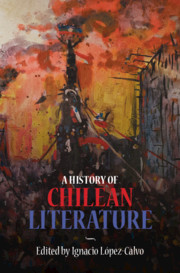Book contents
- A History of Chilean Literature
- A History of Chilean Literature
- Copyright page
- Dedication
- Contents
- Figures
- Contributors
- Acknowledgments
- Introduction
- Part I Proto-Chilean, Colonial Chronicles and Letters
- Part II Nineteenth-Century Articulations of an Embryonic National Consciousness
- Part III Beyond Chileanness: Heterogeneity and Transculturation in Canonical and Peripheral Twentieth- and Twenty-First-Century Literature
- Chapter 12 Gabriela Mistral, Chilean Women Writers, and Intersectionality
- Chapter 13 The Verse as Being in the World
- Chapter 14 Mapuche Poetry
- Chapter 15 The Translation Origins of Literary Mapuche Aesthetics
- Chapter 16 Theatrical Trends and Social Changes in Chile, 1910–2018
- Chapter 17 Jewish Voices, Chilean Literature
- Chapter 18 Chilean Arabic Writing
- Chapter 19 Asian-Chilean Writing and Film, and Chilean Orientalism
- Chapter 20 Croatian-Chilean Literature
- Chapter 21 Chilean-American Writing since September 11, 1973
- Chapter 22 LGBTQ Writing and Cultural Consciousness in Chile
- Chapter 23 Permutations of Selfhood in the Work of José Donoso
- Chapter 24 Isabel Allende, the Post-Boom, and Chilean Exile Literature
- Chapter 25 Roberto Bolaño: His Fiction of History, History of His Fiction
- Chapter 26 Alejandro Zambra and Recent Chilean Narrative
- Chapter 27 Film and Literature in Chile
- Chapter 28 Violence and Memory
- Chpater 29 Chilean Digital Literature
- Chapter 30 Detectives at the End of the World
- Index
- References
Chapter 14 - Mapuche Poetry
Self-Definitions and Representation of Chilean Cultures
from Part III - Beyond Chileanness: Heterogeneity and Transculturation in Canonical and Peripheral Twentieth- and Twenty-First-Century Literature
Published online by Cambridge University Press: 27 September 2021
- A History of Chilean Literature
- A History of Chilean Literature
- Copyright page
- Dedication
- Contents
- Figures
- Contributors
- Acknowledgments
- Introduction
- Part I Proto-Chilean, Colonial Chronicles and Letters
- Part II Nineteenth-Century Articulations of an Embryonic National Consciousness
- Part III Beyond Chileanness: Heterogeneity and Transculturation in Canonical and Peripheral Twentieth- and Twenty-First-Century Literature
- Chapter 12 Gabriela Mistral, Chilean Women Writers, and Intersectionality
- Chapter 13 The Verse as Being in the World
- Chapter 14 Mapuche Poetry
- Chapter 15 The Translation Origins of Literary Mapuche Aesthetics
- Chapter 16 Theatrical Trends and Social Changes in Chile, 1910–2018
- Chapter 17 Jewish Voices, Chilean Literature
- Chapter 18 Chilean Arabic Writing
- Chapter 19 Asian-Chilean Writing and Film, and Chilean Orientalism
- Chapter 20 Croatian-Chilean Literature
- Chapter 21 Chilean-American Writing since September 11, 1973
- Chapter 22 LGBTQ Writing and Cultural Consciousness in Chile
- Chapter 23 Permutations of Selfhood in the Work of José Donoso
- Chapter 24 Isabel Allende, the Post-Boom, and Chilean Exile Literature
- Chapter 25 Roberto Bolaño: His Fiction of History, History of His Fiction
- Chapter 26 Alejandro Zambra and Recent Chilean Narrative
- Chapter 27 Film and Literature in Chile
- Chapter 28 Violence and Memory
- Chpater 29 Chilean Digital Literature
- Chapter 30 Detectives at the End of the World
- Index
- References
Summary
The Mapuche were subjugated first by the Spaniards and then by the Chileans. Throughout the twentieth century they suffered massacres at Forrahue (1912) and Ranquil (1934), along with the dispossession of their lands through scams and tricks. Since the beginning of the 1990s, they have demanded their right to their ancestral lands through political means and by exercising their right to subversion. As a result, the first Chilean government of the period known as the transición chilena (Chilean transition to democracy from 1990 to 1994) accomplished one of the most important changes in the relations between the state and the country’s first nation: the juridical recognition of the existence of indigenous groups and communities in Chile. Although it was a major achievement for Chile, this law was a minor response to Mapuche protest, which had been articulated through different symbolic productions, including poetry.
- Type
- Chapter
- Information
- A History of Chilean Literature , pp. 296 - 316Publisher: Cambridge University PressPrint publication year: 2021



